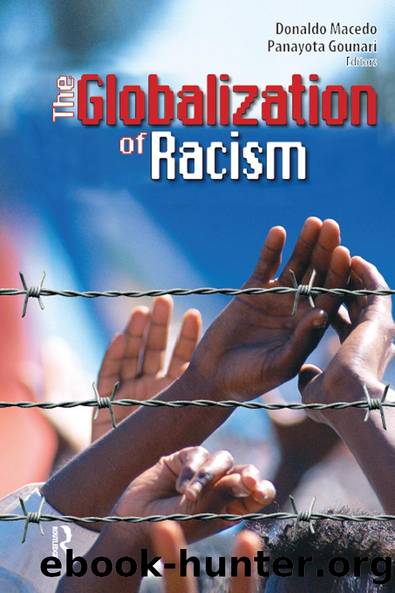Globalization of Racism by Donaldo Macedo Panayota Gounari

Author:Donaldo Macedo, Panayota Gounari [Donaldo Macedo, Panayota Gounari]
Language: eng
Format: epub
Tags: Social Science, Sociology, General
ISBN: 9781317258872
Google: qGfvCgAAQBAJ
Publisher: Routledge
Published: 2015-11-17T05:59:55+00:00
CONCLUSION
When nation-states create a âthreshold of inequality,â when economic organizations select their employees according to economic, cultural, social and symbolic criteria, when people feel hostile towards âforeigners,â we are observing complex systems of domination, which are partly rational, partly traditional and partly hostile. They cannot be characterized by a common content. But they do address a widespread problem: the particular closure of universal modern institutions. I am arguing that structural racism comes in, where official and legitimate reasons fail to justify social closure. Structural racism is a system of tacit domination, which can stabilize barriers to mobility in a globalizing world.
The new racism in Germany can be treated as a testing case for this assumption. It is rarely based on biologist criteria and in fact uses varying concepts, such as citizenship, language, religion, group membership and so on. Nevertheless it offers a social mechanism which can distinguish on a long-term basis between those who interact as equals and those who are either kept at a distance or forced to accept lower status.
I am not proposing that every kind of nationalism is by definition racist. One could imagine shifting limits to the nation-state and criteria for closure which are related in content to the goals of the nation-state. Instead I am suggesting a continuum of closure ranging from benevolent nationalism to outright racist closure. The difference is not in content, but in the form and rigidity of closure and the contingency of criteria. Structural racism works through the tacit and long-term assumptions of symbolic power and it can refer to a wide range of varying criteria. This kind of racism becomes more important when borders are crossed by increasing numbers of migrants and when groups change their status, for example, from colored to Asian to white. By creating stable borders out of contingent criteria, structural racism addresses one of the major problems of modern institutions in a globalizing world: the particularist closure of universalizing institutions.
Download
This site does not store any files on its server. We only index and link to content provided by other sites. Please contact the content providers to delete copyright contents if any and email us, we'll remove relevant links or contents immediately.
The Secret History by Donna Tartt(19052)
The Social Justice Warrior Handbook by Lisa De Pasquale(12187)
Thirteen Reasons Why by Jay Asher(8893)
This Is How You Lose Her by Junot Diaz(6877)
Weapons of Math Destruction by Cathy O'Neil(6264)
Zero to One by Peter Thiel(5786)
Beartown by Fredrik Backman(5737)
The Myth of the Strong Leader by Archie Brown(5499)
The Fire Next Time by James Baldwin(5431)
How Democracies Die by Steven Levitsky & Daniel Ziblatt(5215)
Promise Me, Dad by Joe Biden(5141)
Stone's Rules by Roger Stone(5081)
A Higher Loyalty: Truth, Lies, and Leadership by James Comey(4954)
100 Deadly Skills by Clint Emerson(4921)
Rise and Kill First by Ronen Bergman(4779)
Secrecy World by Jake Bernstein(4741)
The David Icke Guide to the Global Conspiracy (and how to end it) by David Icke(4701)
The Farm by Tom Rob Smith(4502)
The Doomsday Machine by Daniel Ellsberg(4484)
